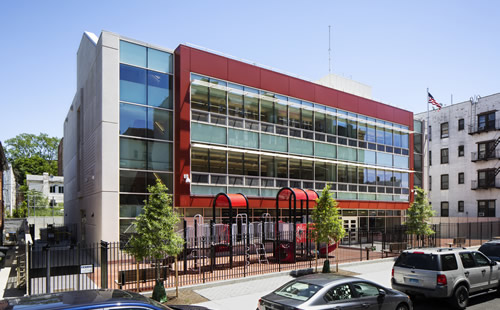New Pre-K Center 613 Completed in Brooklyn
Pre-K Center 613 is a new three-story school in a dense urban block surrounded by residential buildings, developed by the New York City School Construction Authority and designed by MDSzerbaty Associates Architecture as part of the NYC Mayor’s “Pre-K-For-All” initiative.

The school provides 14 classrooms for 252 students and includes an indoor play room, administration offices, and a clerestory-lit multi-purpose room at the cellar level. To shorten the construction duration, a reinforced concrete frame with architectural insulated precast wall panels were chosen for their ability to be rapidly constructed and erected.